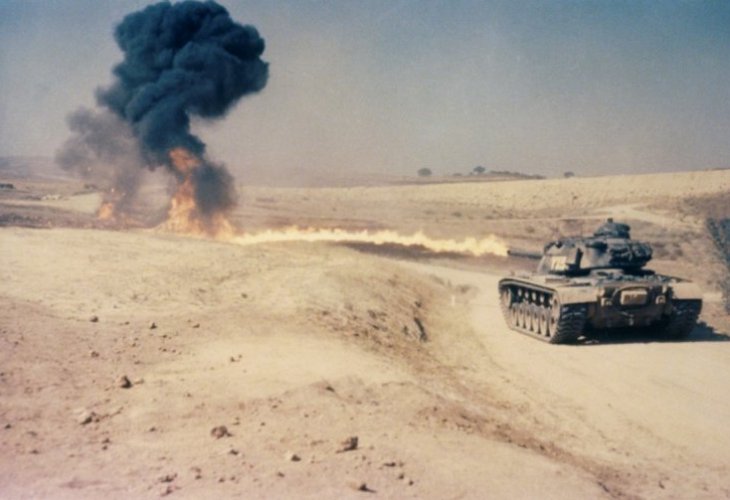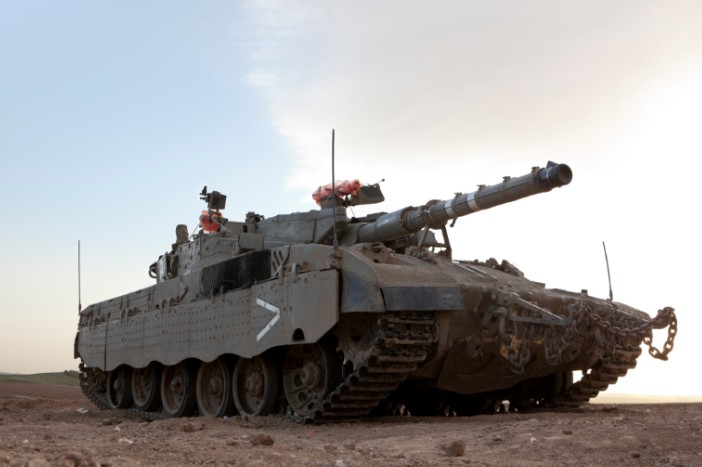56 Years Since the Six-Day War: A Glance at the Miraculous Events
A glimpse into the miracles of the Six-Day War: How did three tanks stop 140 Syrian tanks, and how did Israel defeat Syria, Lebanon, Saudi Arabia, Libya, Morocco, Jordan, Egypt, Iraq in six days?
- נעמה גרין
- פורסם כ"ז אייר התשפ"ג

#VALUE!
![]()
These days mark 56 years since the Six-Day War. Moshe Kinan, a senior officer in the IDF, in his book 'Am Yisrael Chai', recounts his conversation with an officer from the Singapore army, who expressed his admiration for the great miracles that occurred to the people of Israel in the Six-Day War.
"When I was a cadet in the MifCadim (platoon commanders in elite units) course, I remember that simultaneously with our course, another one was conducted, similar to ours, but for officers from foreign armies who work with the IDF. I made friends with a cadet from the Singapore army, a battalion commander named 'Li'. Between us, a warm connection developed. We talked a lot, and I was impressed with his knowledge of the history of the wars of almost all the armies of the world. He surprisingly remembered the names of generals, exact dates, and accurate battle analyses," Kinan writes.
In one of the conversations, he told me: "You know, the reason we study battle legacies and event analyses is to be able to draw lessons and apply them in our battles if necessary. All the battle analyses in the armies of the world and the victories are understandable and serve as models for me to emulate, but so far I have no comprehension or idea how you, such a small nation, managed to win in wars?! What exactly can I learn from you - that Lt. Col. Avigdor Kahalani managed to stop with 3 tanks about 140 Syrian tanks? That in six days you defeated: Syria, Lebanon, Saudi Arabia, Libya, Morocco, Jordan, Egypt, Iraq? That you live in a small country with nearly 6 million Jews surrounded by 1.2 billion Muslims? That you live with more than sixty warnings of attacks a day?!"
"What precisely can I learn from the Gulf War," the Singaporean officer continued to ask Kinan, "Saddam Hussein attacks you with 39 Scud missiles, damaging around 10,500 homes, and in the IDF documents it appears that one person was killed, Mr. Eitan Greenwald, of blessed memory. Tell me seriously, officer to officer, what lessons and conclusions can be drawn from such wars?"
Kinan continues and writes: It seems that this question was already discussed thousands of years ago. Emperor Adrian came to Israel to continue the destruction after Titus returned to Rome, and although he sowed great destruction in Israel, the emperor was impressed with the endurance of the people of Israel. It is told in the Midrash (Tanchuma, Toledot, 5) as follows: "Adrian said to Rabbi Yehoshua: 'Great is the sheep (the people of Israel) that stands among seventy wolves (the seventy nations of the world)!' He said to him: 'Great is the shepherd (Hashem) who saves it and guards it, and breaks them before it'. This is the answer to the Singaporean officer’s question: with us, the battle is managed by Hashem, not by natural means...
Watch the story behind the war, courtesy of 'Kan' - the Israeli Broadcasting Corporation:
Major General Ezer Weizman: "Finger of God"
Head of Operations Branch, Major General Ezer Weizman, was asked by Mr. Lebanon, father of a pilot who fell a few years ago: "How do you explain the fact that for more than three consecutive hours our pilots continued their attacks on airports, flying from place to place, and the Egyptians did not notify each other 'what happened there' to defend themselves?" Ezer Weizman remained silent, lifted his head up and said, "Finger of God"...
Col. Uri Banari: "The fear of the Jews fell on the Arabs"
Lieutenant Colonel Uri Banari, commander of the armored brigade that conquered the difficult area around Jerusalem, said: "If someone had said in a military school that it is possible within a few hours to move an entire brigade from the lowlands to the mountains, immediately enter a battle and achieve victories, they would see the individual as a dream spreader and talking nonsense, my brigade did it".
"At the entrance to 'Nablus' stood thousands of people, waving white handkerchiefs and applauding us. We innocently returned their greeting with a smile and entered the city, and wondered: 'We are going and the order is not disturbed, and there is no panic, local guards stood with rifles watching the order, and a cheering crowd'. Suddenly, something happened that changed everything at once, one of the officers wanted to take a rifle from an Arab standing beside us, he refused to hand over the rifle, and the officer fired a burst into the air, at that moment the crowd disappeared, the streets emptied, and soon gunfire began. I could not understand what was happening? But then I realised what had happened - the residents of 'Nablus' thought we belonged to the Iraqi force that was supposed to come to them from Jordan... And indeed, to the west of the city, there were many enemy tanks (Nablus Arabs), they did not operate them against us but simply because they thought we were their forces, they realized their mistake very late".

"The Arabs were surprised, the fear of the Jews fell on them. In Hebron and Nablus, Jenin and Jericho, the Arabs held weapons in abundance. Not even a small Arab village remained unarmed. Quickly, the Arabs hid their weapons, they did not think of using them anymore. They raised their hands in surrender, waved white flags on every building, the fear of Hashem fell on hundreds of thousands of arrogant Arabs, filled with hatred and enmity to Israel, who only yesterday-swore to fight it to the last drop of their blood".
Sergeant Yerushalmi, David: "Their hands were tied from the heavens"
David, a Jerusalemite sergeant, recounts: "After Jenin, we advanced to conquer the West Bank, and behold from an orchard we were fired upon. I thought that some lone soldier or local resident desired to use his weapon, I told the force to continue, and I alone entered the orchard. What did I find there? About forty soldiers and unsystematic Arabs, members of a civilian guard who joined them, all armed. For a moment, I was stunned, I thought my end had come, and why did I dare to go alone towards the shots and entangle myself without a way out? At the last moment, I decided not to surrender easily, to fight to the last bullet and then fall. In fact, I neither fought nor fell. From the heavens their hands were tied, they surrendered to me - to one single soldier - and it was on me only to finish the task".
Chief of Staff Yitzhak Rabin summarized the war in 7 thrilling words
A victory with no parallel: Israel's achievements in the miraculous war
Reserve Paratrooper Soldier, Israel: "The Egyptian sergeant said his hands became paralyzed"
Israel, a taxi driver, was recruited for reserve duty in the paratroopers unit that was tasked with conquering - after a parachute jump - the Tiran Straits. He recounted upon his return: "The Israeli soldiers did not parachute from the Nordics that carried them to Tiran, they descended from the planes like pampered tourists, at the airport, because the Egyptian battalion securing the area fled from there before the Israeli paratroopers appeared on the horizon. When we landed, I was sent with another soldier, an electrician, to patrol the area. We had barely moved two kilometers from the camp buildings when we faced an Egyptian half-track, full of soldiers, machine gun barrels protruding in all directions, and us with only light weapons and a number of bullets insufficient to stop the half-track for even a moment. We couldn't run back to the camp, so we stood, waiting for the shot, and pointed our rifles without any real hope. But the Egyptians did not shoot, they also stood still, we decided to cautiously approach the half-track, and there we found 18 Egyptian soldiers, armed, weapons at hand, sitting frozen, terror reflected on their faces. They looked at us in boundless fear, as if pleading for mercy. I shouted: "Hands up! Raise your hands!" In a moment, the Egyptians threw down their weapons, and we led them into captivity with raised hands. On the way, as I calmed down, I asked the Egyptian sergeant next to me: "Tell me, why didn't you shoot us?" And he, barely muttered: "I don't know, the hands froze, they became paralyzed, I was completely paralyzed, I don't know why...". Another thing we found out was that these soldiers did not know that the Tiran Straits were already in our hands, they had returned from a patrol in the vicinity". "Why they didn't eliminate us? I have no answer, and how can one say God did not help us?!" Israel concluded his story.
Rabbi Mordechai Eliyahu zt"l in a particularly moving story about the Six-Day War:
"Do you believe in God?!"
I will conclude in the spirit of the opening: In one of my conversations with 'Li' the Singaporean officer in the MifCadim course, we sat during a break between classes in the corridor separating the classes, refreshments were served: cakes, fruits, and hot coffee. 'Li' poured me a cup of coffee and a slice of cake, he immediately ate the cake and slowly drank the hot coffee, and I held the cake slowly in my right hand and blessed aloud: "Blessed are You, Hashem... Creator of various kinds of sustenance", I expected the blessing to provoke a question or at least spark his interest, but 'Li' paid no attention and continued to eat.
I asked him: "Are you not interested in whom I'm blessing?"
"Blessing?", 'Li' asked in wonder, "this is not the first time, my friend, that I see you speaking to food and drink".
I replied with a smile: "I am not speaking to the food, I am simply praying to God and thanking Him for the food"
"God?!", 'Li' wondered again, "you Jews don't believe in God, Muslims believe in God, Christians believe in God, you believe in yourselves!".
I explained to the Singaporean officer that this is not true, and that we believe and pray to God.
"How did you reach this conclusion?" I asked him.
The officer stood up and said to me: "Listen, besides the Israeli army, we visited the Egyptian army, in the United States. There I constantly heard the name of God, generals mention it in every lesson, in every briefing, in every lecture, the name of God. And now I am already visiting the IDF for three months, and this is the first time I openly hear there is a God in Israel".
"Moshe", he asked, "what are you ashamed of?!". "I was silent," Kinan continues in his words, "and didn't know what to answer".
The recordings from the Six-Day War are revealed. Watch:

